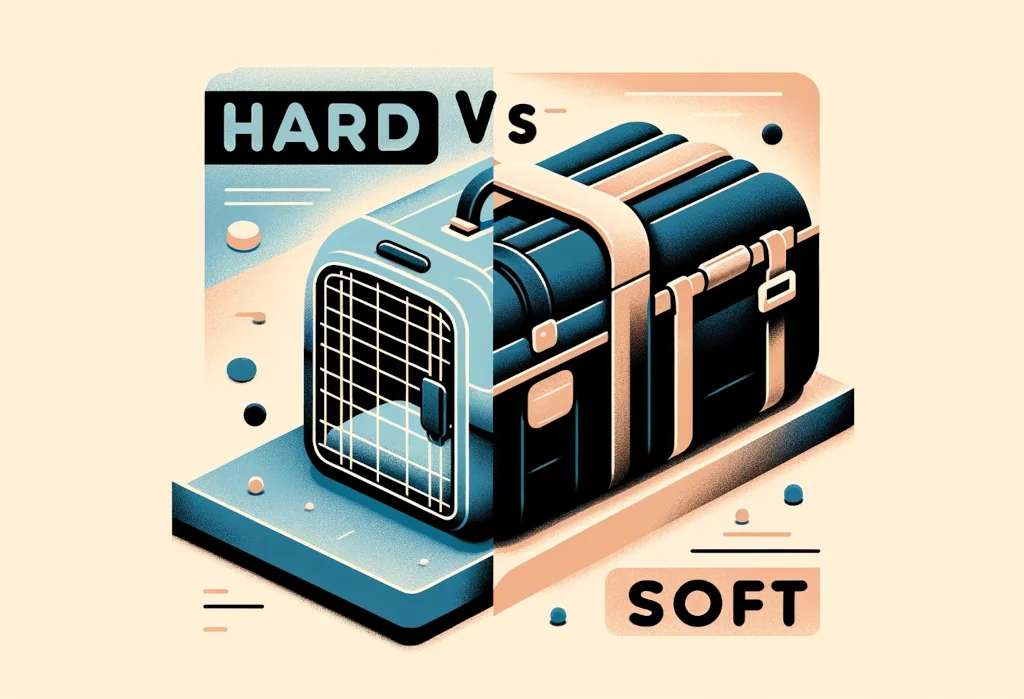
Choosing the perfect dog carrier feels a lot like trying to solve a puzzle with missing pieces. You want your furry friend to be safe and comfortable, but with so many options, it’s hard to know where to start. In this blog post, we’re going to give you the lowdown on hard vs soft dog carriers, helping you make a decision that feels right for both you and your pup.
Quick Takeaways:
- Hard carriers offer durability and protection but can be bulky and heavy; ideal for larger or more active dogs.
- Soft carriers provide unmatched comfort and are airline-friendly, best suited for smaller, calm pets or those with joint issues.
- Decide based on your dog’s size, temperament, and your travel needs, considering both storage convenience and your physical comfort.
Why Does the Type of Dog Carrier Matter?
Choosing the right type of dog carrier isn’t just about ticking a box on your pet travel checklist; it’s about understanding your dog’s unique needs, size, temperament, and the purpose behind using the carrier.
Whether it’s for air travel, a visit to the vet, or a road trip, the right carrier can make a world of difference in how your dog experiences the journey. A snug and secure carrier can soothe a nervous pet, while a roomy and breathable one might be better for a larger, more relaxed dog. Let’s dive into the nitty-gritty of hard vs soft dog carriers so you can make an informed choice that feels right for you and your furry companion.
What Are the Pros of Hard Dog Carriers?
Durability : Hard carriers are typically made from sturdy materials like heavy-duty plastic which can withstand the rigors of travel better than their soft counterparts. This means they are less likely to tear or become damaged, offering a longer lifespan.
Easy to Clean : A simple wipe down with a damp cloth or a quick wash is usually all that’s needed to keep a hard carrier looking clean and fresh, making them an excellent choice for pets prone to accidents or those who get messy easily.
Protection for Your Dog : Hard carriers offer a secure environment that can protect your pet during travel. They’re less likely to collapse or bend, offering added protection in case of an impact. This can provide peace of mind, especially during air travel or long road trips.
Ventilation : Many hard carriers are designed with ample ventilation on all sides, ensuring your dog gets plenty of fresh air and does not overheat.
Unique Advantage : One unique benefit of hard carriers that often goes unnoticed is their stackability. For pet owners with multiple pets or those who need to save space, hard carriers can often be stacked when not in use, a practical solution that soft carriers simply can’t offer.
What Are the Cons of Hard Dog Carriers?
Heaviness : One of the biggest drawbacks is their weight. Hard carriers tend to be much heavier than soft ones, making them less convenient to carry, especially if you have to walk long distances, like in airports or for extended vet visits.
Bulkiness : Along with being heavy, hard carriers can be awkward to carry and store. They don’t fold down like soft carriers, so you need to have dedicated storage space in your home or car.
Less Comfort for Some Dogs : Though they offer great protection, some pets might find the hard floors and walls less comforting during travel. This can lead to anxiety or discomfort, especially for furry friends who are used to snuggling into softer spaces.
Choosing between a hard and soft dog carrier hinges on prioritizing what’s most important for your dog’s comfort and safety, and your convenience. Whether you lean towards the sturdy protection of a hard carrier or the snug, cozy feel of a soft one, understanding these pros and cons will ensure you make a choice that best suits your furry friend’s needs. And remember, the journey is just as important as the destination, so let’s make it a comfortable one for your pet.
What Are the Pros of Soft Dog Carriers?
When it comes to traveling with your furry friend, comfort and convenience often top the list of priorities. Soft dog carriers bring a lot to the table, ensuring your pup’s travels are as cozy as your lap. Let’s delve into the benefits these plush sanctuaries offer:
-
Unmatched Comfort for Your Dog : The plush interiors of soft carriers are gentle on your pet’s joints, perfect for puppies, seniors, or dogs with arthritis. The soft walls create a comforting nest, minimizing stress during travel.
-
Lightweight and Easy to Carry : Unlike their hard counterparts, soft carriers are featherweights. You’ll appreciate the ease of maneuvering through crowded airports or bustling streets without the added bulk.
-
A Win for In-Cabin Air Travel : Most airlines give the nod to soft carriers for in-cabin travel. Their flexible structure allows them to fit under the seat with ease, ensuring your pet stays close during flights.
-
Style Meets Functionality : Today’s soft carriers come in various chic designs and colors. They don’t just serve as a cozy nook for your pet but also a stylish accessory for you.
What Are the Cons of Soft Dog Carriers?
Despite the numerous advantages, soft dog carriers have their fair share of caveats. Recognizing these potential drawbacks is key to making an informed decision:
-
Durability Questions : Soft carriers may not stand the test of time as well as hard carriers. Claw-happy pets or accidental tears can shorten their lifespan.
-
Cleaning Can Be Tricky : Accidents happen, especially when traveling. Soft carriers, with their fabric materials, can be harder to clean thoroughly compared to the wipe-down simplicity of hard carriers.
-
Less Protection Against Impacts : In the face of bumps and knocks, soft carriers offer less protection. This is something to consider if your travels involve more rugged conditions.
How Do You Decide Which Carrier Is Right for Your Dog?
Choosing between a hard and soft dog carrier boils down to understanding your dog’s needs, your lifestyle, and the specifics of your travel plans. Here’s how to weigh your options:
-
Assess Your Dog’s Size and Temperament : Larger dogs or those with a penchant for chewing might be better suited to hard carriers for durability and safety. Soft carriers are ideal for smaller, calmer pets.
-
Consider Your Mode of Travel : Planning to fly? A soft carrier might be your best bet. If you’re heading out on a road trip, a hard carrier can offer more protection.
-
Think About Storage : Soft carriers can be easily folded and tucked away when not in use, making them a space-saver compared to hard carriers.
-
Reflect on Your Physical Comfort : If you’ll be carrying your pet for extended periods, a soft carrier will likely be more comfortable for you both.
Unique Insight : An often-overlooked factor is the climate you’ll be traveling in. For colder environments, a soft carrier can provide better insulation to keep your pet warm. However, in hotter climates, make sure the soft carrier has ample ventilation to prevent overheating.
Choosing the right carrier for your dog doesn’t have to be a tough decision. By taking into account your pet’s needs and your own lifestyle, you can ensure travels that are safe, comfortable, and joyful for both of you. Remember, the best carrier is the one that suits your unique situation and ensures your furry friend’s tail keeps wagging, mile after mile.
Alex, a passionate animal lover, has experience in training and understanding animal behavior. As a proud pet parent to two dogs and three cats, he founded AnimalReport.net to share insights from animal experts and expand his knowledge of the animal kingdom.




